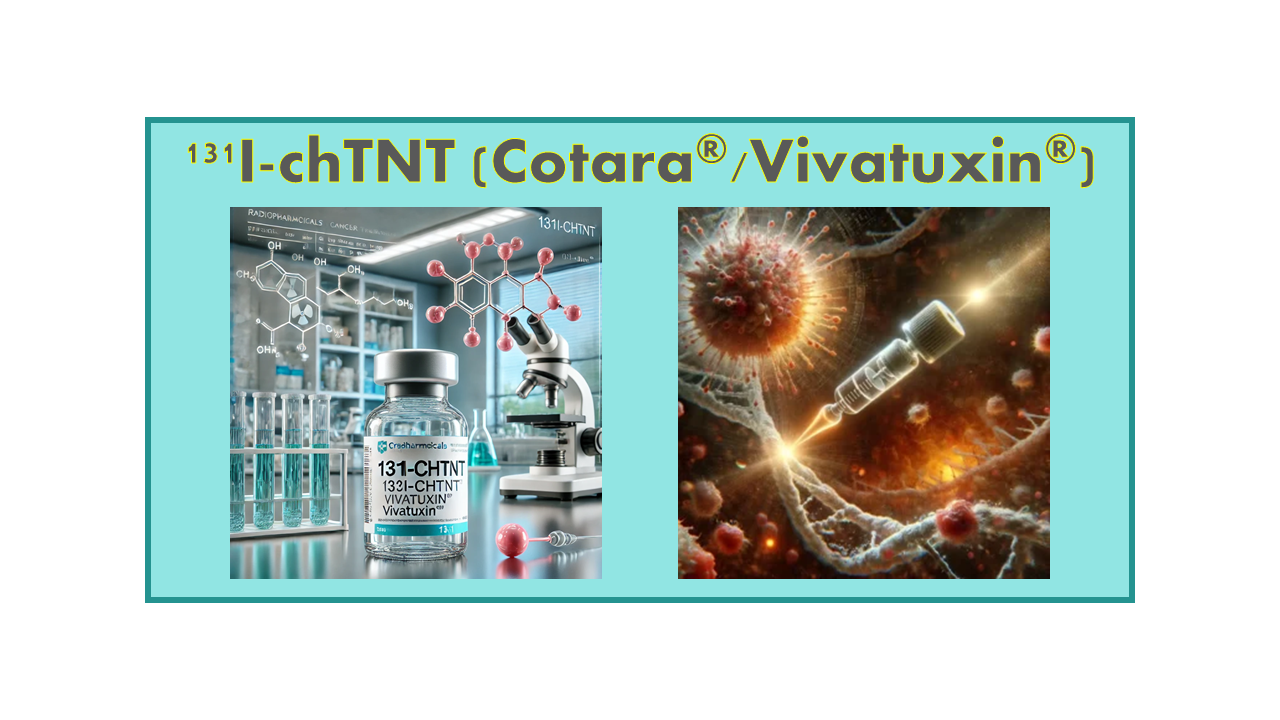
131I-chTNT (Cotara®/Vivatuxin®)
December 24, 2024
Development Overview
131I-chTNT, also known by various names such as Tumor Necrosis Therapy-1 (131I-chTNT-1/B), 131I-TNT, Cotara®, Vivatuxin®, and more recently 131I-derlotuximab biotin (as per the USAN name adopted in February 2015), is a monoclonal antibody targeting DNA/histone complexes. This innovative therapeutic agent was developed by Avid Bioservices (formerly Peregrine Pharmaceuticals and Techniclone) to treat brain cancer through direct in situ infusion into tumors. The treatment strategy leverages the precision targeting of radiation therapy to eradicate malignant cells effectively.
Cotara has achieved significant regulatory milestones, including orphan drug status and fast-track designation from the U.S. Food and Drug Administration (FDA) for the treatment of glioblastoma multiforme (GBM) and anaplastic astrocytoma. These designations underscore the urgency and unmet need for effective treatments for these aggressive brain cancers. The patent rights to Cotara were secured in July 1994 following the merger of Peregrine Pharmaceuticals and Cancer Biologics, Inc.
Despite its potential, Cotara has yet to generate product revenue. Shanghai MediPharm Biotech (formerly Brilliance Shanghai Pharmaceuticals) holds the license to develop and commercialize Cotara in China for lung cancer treatment. Under the brand name Vivatuxin®, the product was introduced in the Chinese market in January 2007. However, a legal dispute between Peregrine Pharmaceuticals and Shanghai MediPharm Biotech led to a 2009 settlement agreement restricting Shanghai MediPharm from selling radiolabeled TNT products outside China.
Clinical Applications
Vivatuxin® is approved in China for the treatment of lung cancer and is being further developed for brain and liver cancer. Each patient dose typically contains 50 mCi of the radiolabeled compound.
In the United States, Cotara underwent clinical development, progressing through Phase I and II trials and entering Phase III in 2013 for recurrent glioblastoma multiforme (GBM). Phase II trials demonstrated a median overall survival (OS) of 9.3 months for treated patients. Despite these advancements, Avid Bioservices halted all research and development programs in January 2018, effectively discontinuing nuclear medicine activities, including Cotara’s development for GBM.
In China, clinical registrations for Vivatuxin® are ongoing for glioma and liver cancer. Preclinical studies are also exploring its potential for colorectal and breast cancers.
Availability and Pricing
Vivatuxin® is exclusively available in China through Shanghai MediPharm Biotech for lung cancer treatment. A strategic collaboration with the Chinese Ministry of Health has facilitated the provision of over 20,000 doses, priced at approximately $3,000 (EUR 2,700) each, for advanced lung cancer patients who have failed at least one prior chemotherapy regimen (as of 2010). Revenue projections for 2013 estimated sales of $143 million (EUR 130 million) with a net profit of $52 million (EUR 47 million), equating to treatment for approximately 50,000 patients. These figures remain unverified. Avid Bioservices’ transition to a Contract Development and Manufacturing Organization (CDMO) in 2018 marked the end of its involvement with Cotara and other nuclear medicine projects.
Clinical Development
Cotara advanced to Phase III clinical trials in 2013 with an agreement from the FDA for a single registration trial involving 300 patients with recurrent GBM. However, this trial was never initiated. Instead, Peregrine Pharmaceuticals shifted its focus to the non-radiolabeled antibody Bavituximab, combined with radiation and temozolomide, for newly diagnosed glioblastoma. Following the rebranding to Avid Bioservices in 2018 and the discontinuation of its R&D division, the U.S. Cotara program was effectively terminated.
Meanwhile, in China, Vivatuxin® remains under Phase III clinical study registration for glioma and liver cancer, with additional preclinical trials targeting colorectal and breast cancers.
Competitive Landscape
Glioblastoma multiforme (GBM) serves as a model for rapid clinical development due to its aggressive progression and short survival timelines. Various therapeutic agents, including 131I-TLX101, 131I-81C6 mAb, and 211At-81C6, have been developed to target GBM, although none have demonstrated significant efficacy to date. Among these, Vivatuxin® stands out as the only approved therapy available for any indication, albeit restricted to the Chinese market.
Market Considerations
GBM accounts for approximately 43% of all malignant brain tumors, predominantly affecting older adults with a median diagnosis age of 64 years. The five-year survival rate is under 5%, highlighting the critical need for effective treatments. However, survival improvements of less than six months offer limited clinical progress for these patients. In Western markets, treatments demonstrating OS improvements of over 6-9 months can command prices exceeding EUR 40,000 (USD 44,000) per treatment. This is significantly higher than the cost of Vivatuxin® in China, which sells for $3,000 per dose.
Given Avid Bioservices’ discontinuation of R&D operations, Cotara’s development program is effectively on hold, with future advancements largely dependent on Chinese clinical and commercial efforts.